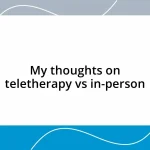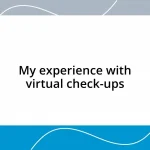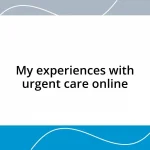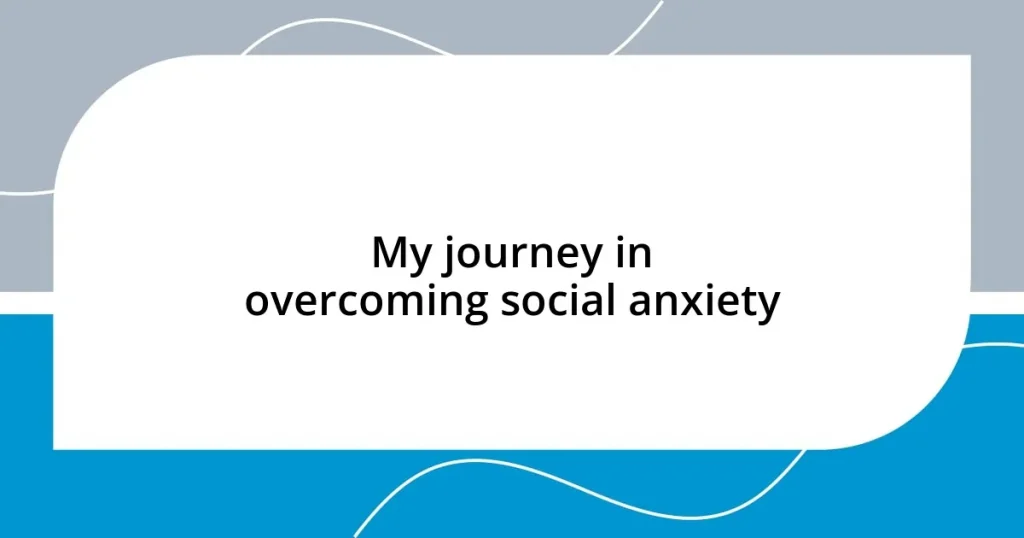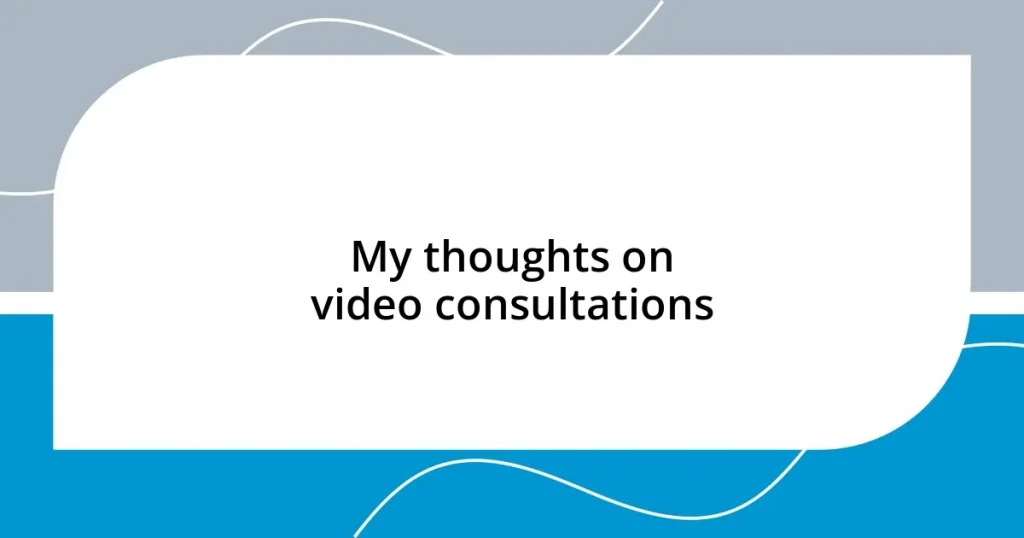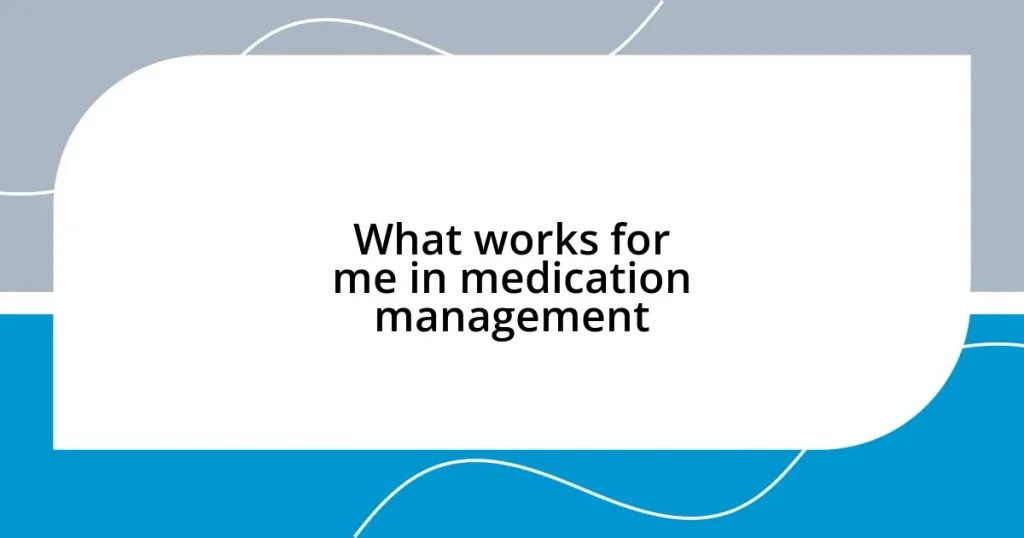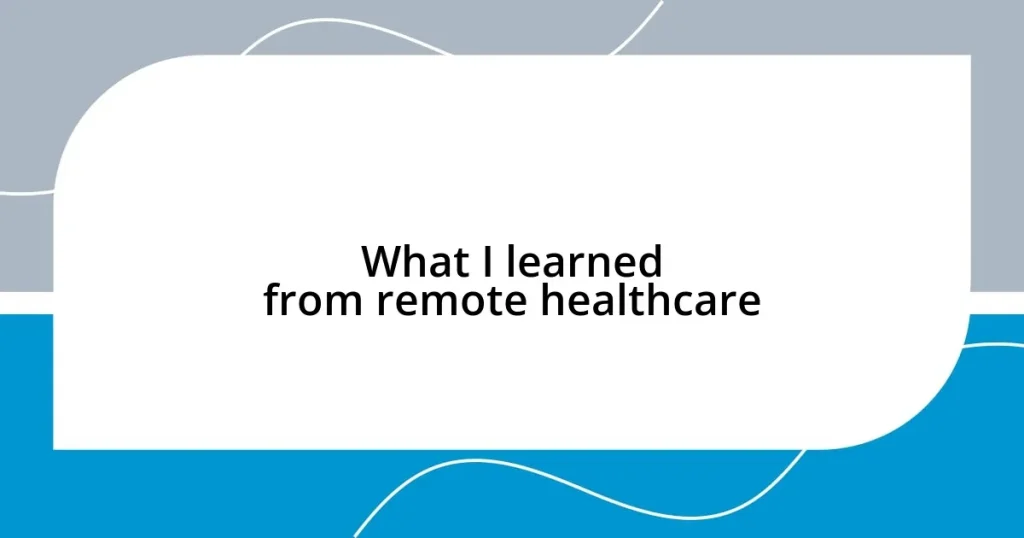Key takeaways:
- Understanding social anxiety involves recognizing its deep-rooted nature and personal triggers, which helps in managing anxiety effectively.
- Implementing gradual exposure techniques allows individuals to face fears incrementally, building confidence through small achievements.
- Building a supportive social network fosters connections and offers emotional support during challenging moments, reinforcing the journey toward overcoming anxiety.
- Tracking progress and celebrating milestones highlight personal growth and reinforce positive changes in handling social situations.
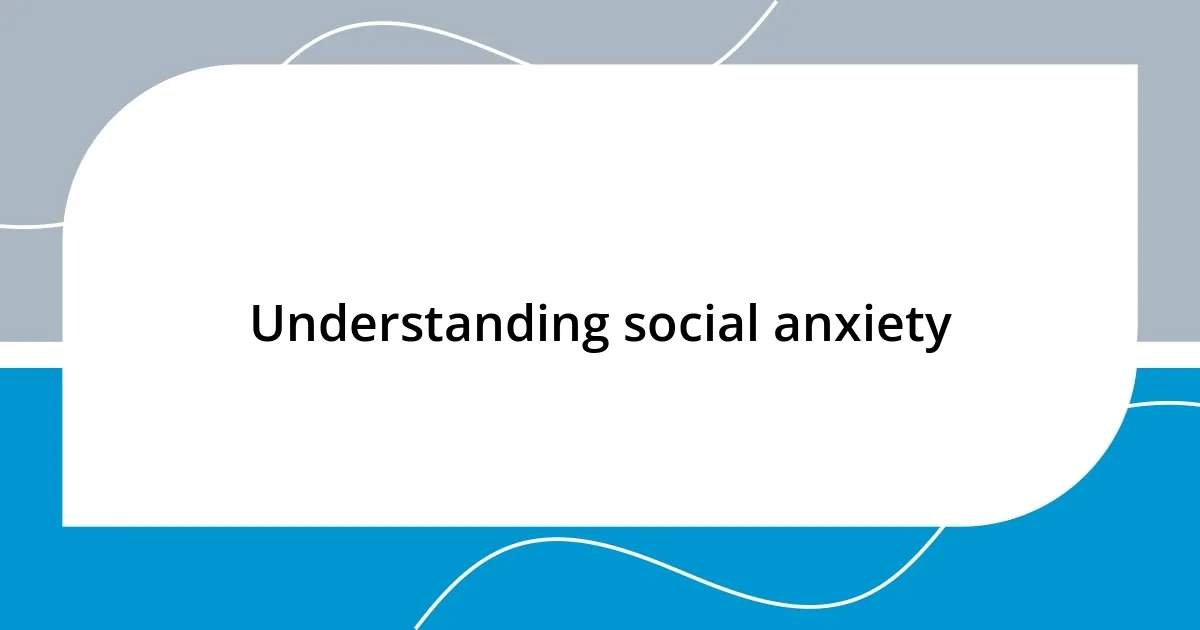
Understanding social anxiety
Social anxiety can feel like an invisible weight, causing a constant sense of dread in social situations. I remember a time when I dreaded simply attending a friend’s gathering; my mind raced with fears of judgment and embarrassment. Isn’t it strange how our own thoughts can become our worst critics?
At its core, social anxiety is more than just nervousness; it’s a deep-rooted fear of negatively being evaluated by others. I often caught myself overanalyzing every word I said or any gesture I made. It’s a exhausting cycle where self-doubt thrives. Have you ever felt that way?
Understanding the nuances of social anxiety means acknowledging that it can manifest differently for everyone. From blushing or sweating to feeling physically sick, each symptom can deeply impact daily life. I’ve had days where even a simple phone call seemed like an insurmountable challenge. It’s crucial to recognize these feelings as valid and not merely as personal failures.
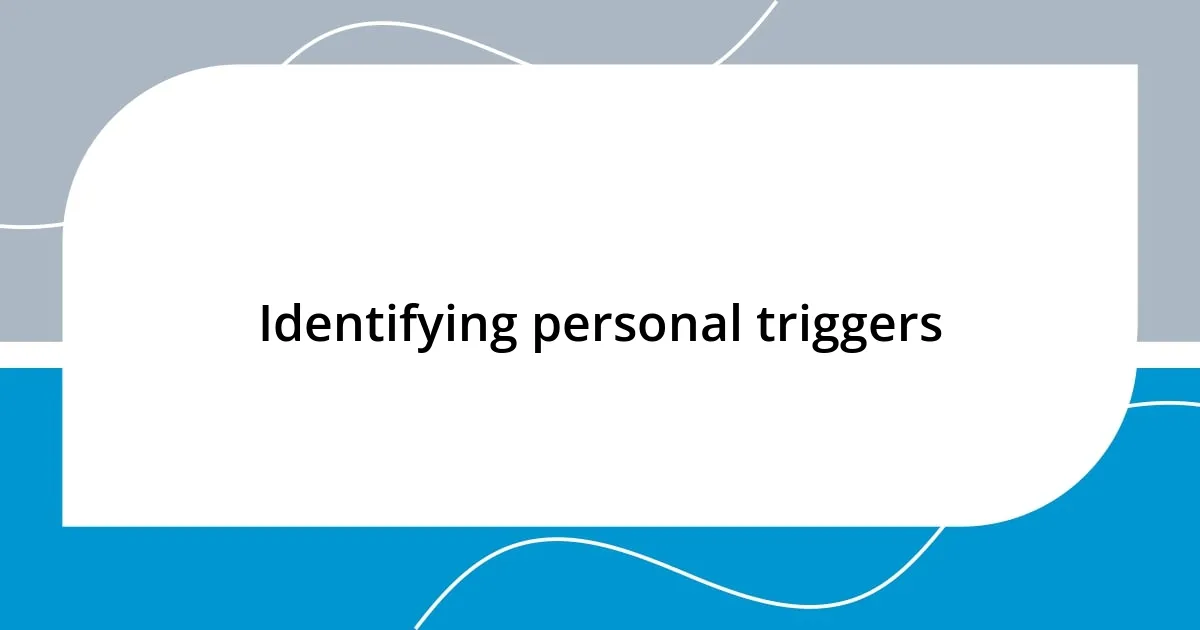
Identifying personal triggers
Identifying personal triggers is a critical step in navigating social anxiety. I’ve learned that certain scenarios can ignite my anxiety more than others. For me, it was gatherings with unfamiliar people or any situation where I felt judged. Recognizing these moments isn’t about fearing them; rather, it’s about understanding where my anxiety originates.
To pinpoint your own triggers, consider the following:
- Specific social situations (like parties or large meetings)
- Certain environments (like crowded places or quiet rooms)
- Types of conversations (like small talk or deep discussions)
- Interactions with particular people (like authority figures or acquaintances)
- Feelings of being observed or scrutinized
By identifying these triggers, you can prepare yourself emotionally and develop strategies to cope. I recall once pinpointing my fear of public speaking. Just knowing it was a trigger helped me tackle it more effectively, rather than avoiding it altogether.
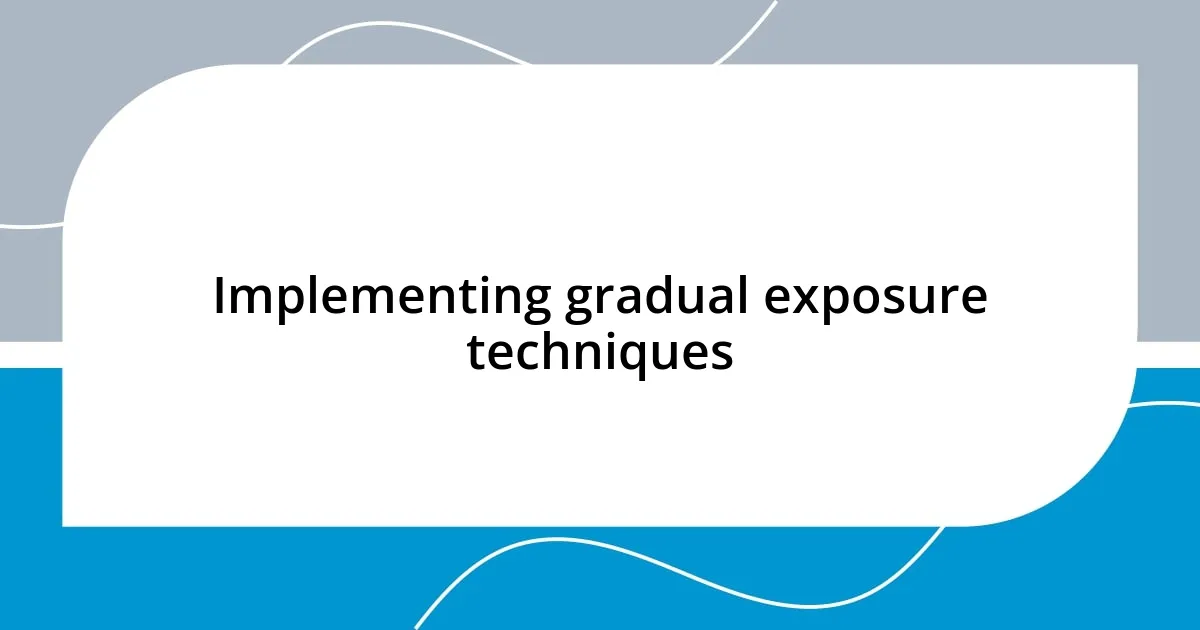
Implementing gradual exposure techniques
Implementing gradual exposure techniques has been a transformative part of my journey in managing social anxiety. One effective method I discovered is starting with less intimidating situations before facing bigger challenges. I remember when I practiced this approach by volunteering to share a simple thought in a small group discussion at work. Initially, it felt uncomfortable, but over time, I noticed my anxiety lessened each time I participated.
The concept of gradual exposure means slowly facing the situations that trigger anxiety, while giving yourself the space to adapt. I often rate my anxiety levels on a scale for various scenarios. For instance, while I ranked joining a large gathering as an 8 out of 10 in anxiety, a casual coffee with a friend was more like a 3. Gradually, as I pushed myself from that coffee meeting to small talk with colleagues, my confidence started to grow in surprising ways.
I encourage you to outline your own hierarchy of fears and tackle them one by one. It’s a bit like climbing a ladder—each step builds your resilience and can lead to unexpected victories. After a few weeks of this practice, I found myself engaging in conversations that would have once left me paralyzed with fear. The progress may seem slow, but each small achievement adds up to significant change.
| Exposure Level | Anxiety Rating |
|---|---|
| 1: Coffee with a friend | 3 |
| 2: Small group discussion | 5 |
| 3: Office gathering | 6 |
| 4: Public speaking event | 8 |
| 5: Large party | 9 |
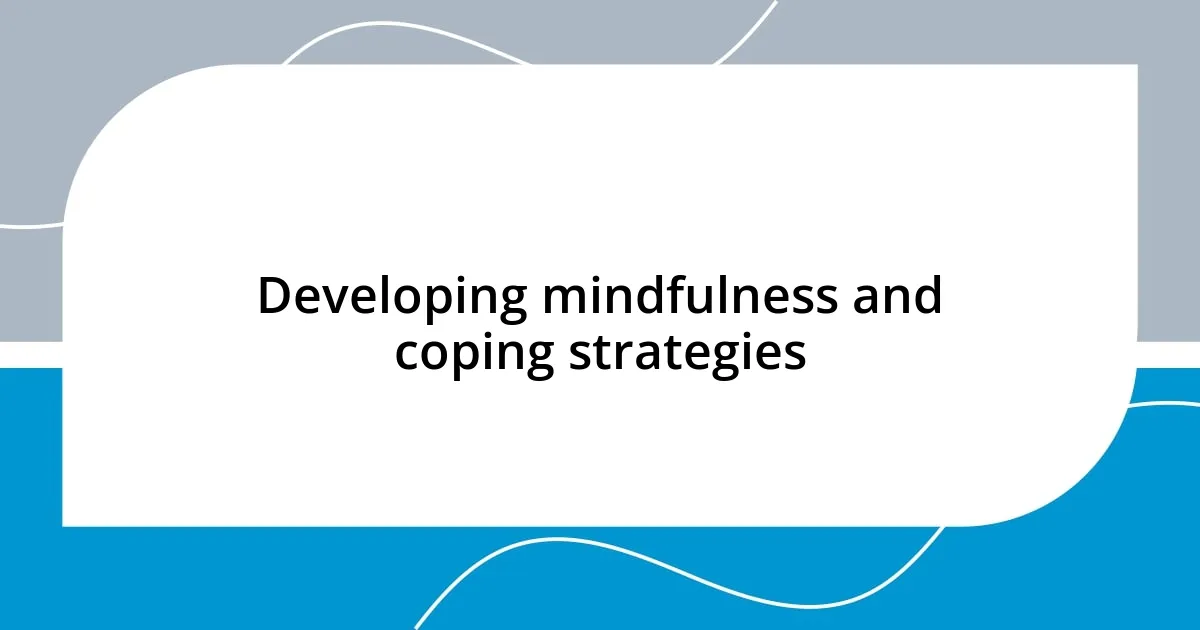
Developing mindfulness and coping strategies
Mindfulness became a lifeline for me in navigating social anxiety. I remember the first time I tried a breathing exercise before stepping into a social event; it felt like pressing a reset button on my racing thoughts. Focusing on my breath helped me anchor myself in the present moment, easing the apprehension swirling in my mind. Have you ever felt overwhelmed by your thoughts in a crowd? Practicing mindfulness can be a game changer, allowing you to observe your feelings without becoming consumed by them.
In addition to mindfulness, I found it incredibly helpful to develop specific coping strategies tailored to my experiences. For instance, I started carrying a small notebook where I would jot down positive affirmations or reminders of successful social interactions. One was particularly memorable: “You survived last time; you can do it again!” Each time I felt anxious about an upcoming event, I would read through these notes, and it truly shifted my perspective. Have you ever thought about what’s worked for you in the past? Reflecting on those personal victories can be a powerful motivator.
Finding a blend of mindfulness and coping strategies has created a nurturing space for my growth. It’s like assembling your own toolkit; some tools work better at different times. Recently, when facing a challenging networking event, I used visualization techniques to picture a successful interaction. Imagining myself confidently engaging with others meant that, when the moment came, I was ready to shine. Can you recall a time when visualization helped you? Embracing these techniques has transformed how I approach anxiety, turning moments of dread into opportunities for connection.
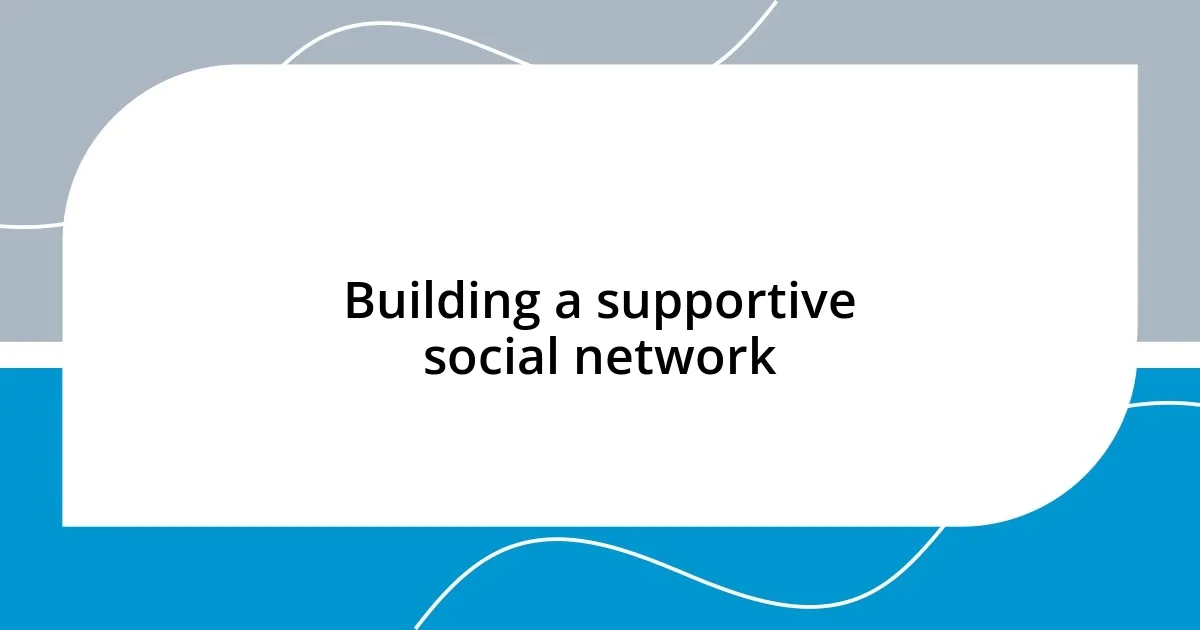
Building a supportive social network
Building a supportive social network was crucial in my journey to overcoming social anxiety. I distinctly remember the first time I reached out to a group of acquaintances and suggested we form a regular coffee meet-up. The thought of putting myself out there made my heart race, but what I found was a welcoming group eager to connect. Isn’t it amazing how simply sharing a common interest can foster a sense of belonging?
Establishing these connections didn’t happen overnight. I often felt hesitant, wondering if I’d be accepted or if my awkwardness might scare people away. However, I learned that vulnerability can breed authenticity. One evening, during a casual gathering, I decided to share a story about my struggles with anxiety. To my surprise, others opened up about their experiences too. Suddenly, it felt like I wasn’t just building a network, but a community rooted in empathy and understanding. Have you ever felt that kind of connection where suddenly, the fear dissipates?
Creating a nurturing social environment allowed me to lean on others during tough times. When I experienced a particularly anxious week, my friends rallied around me with messages of support and check-ins. I recall one friend even inviting me for a walk in the park, encouraging me to breathe in the fresh air and share what was weighing on my mind. That small gesture reinforced the idea that I wasn’t alone in my journey. How do supportive friends make you feel in your toughest moments? The power of genuine relationships became a lifeline, reminding me that connection can light the way through even the most challenging experiences.
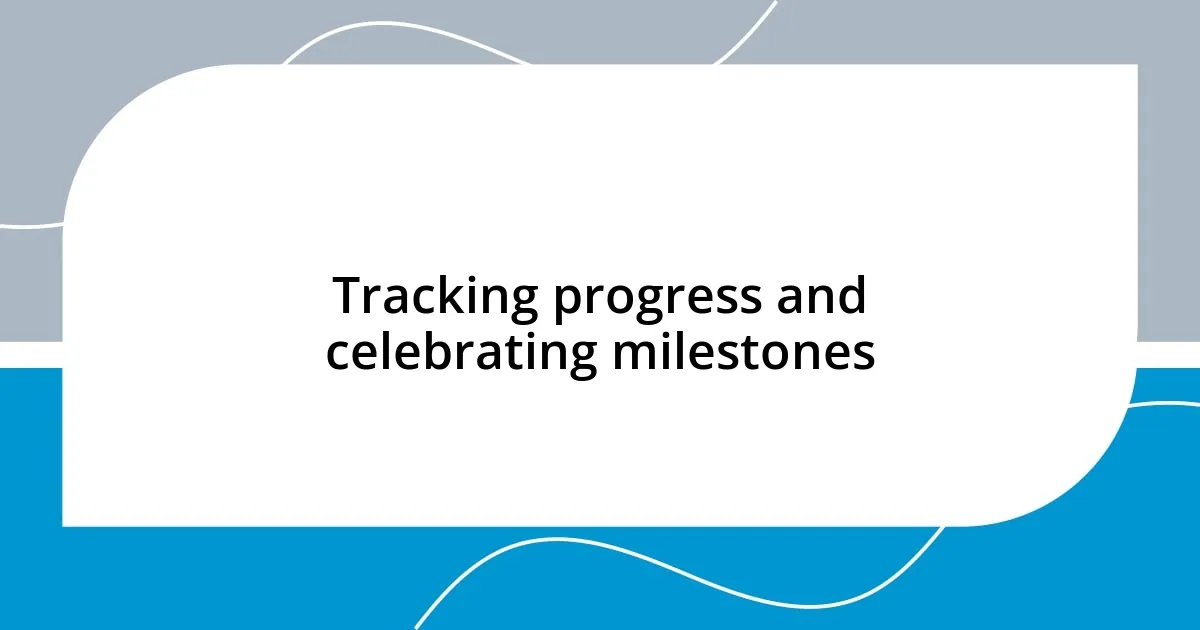
Tracking progress and celebrating milestones
Tracking my progress in overcoming social anxiety has been an illuminating experience. I created a simple journal, documenting my feelings after each social event. When I flipped through those pages, I was astonished at the growth I could see—it wasn’t just about how many events I attended but how my emotional responses shifted over time. Have you ever looked back and realized how far you’ve come, even if it didn’t feel like a big change at the moment?
Celebrating milestones has also been incredibly rewarding for me. I remember the day I confidently struck up a conversation with a colleague I barely knew. That felt monumental! Instead of brushing it off, I treated myself to a small reward—a favorite dessert at my go-to café. Each milestone, no matter how small, deserved recognition. With every pat on the back, I reinforced the idea that overcoming social anxiety isn’t just a journey; it’s a series of victories worth celebrating. How do you recognize your achievements?
When my journal entries revealed a pattern of increased comfort in social situations, I knew it was time for a celebration. I gathered a few close friends for a casual get-together, sharing my progress and even my journal! What struck me was how their support made each milestone feel even more profound. Looking around that room, I felt seen, heard, and genuinely proud of the steps I had taken. Have you ever shared your journey with someone who truly understands? Celebrating progress with the people who matter reinforces that we’re not alone, and it can make the path feel a little less daunting.
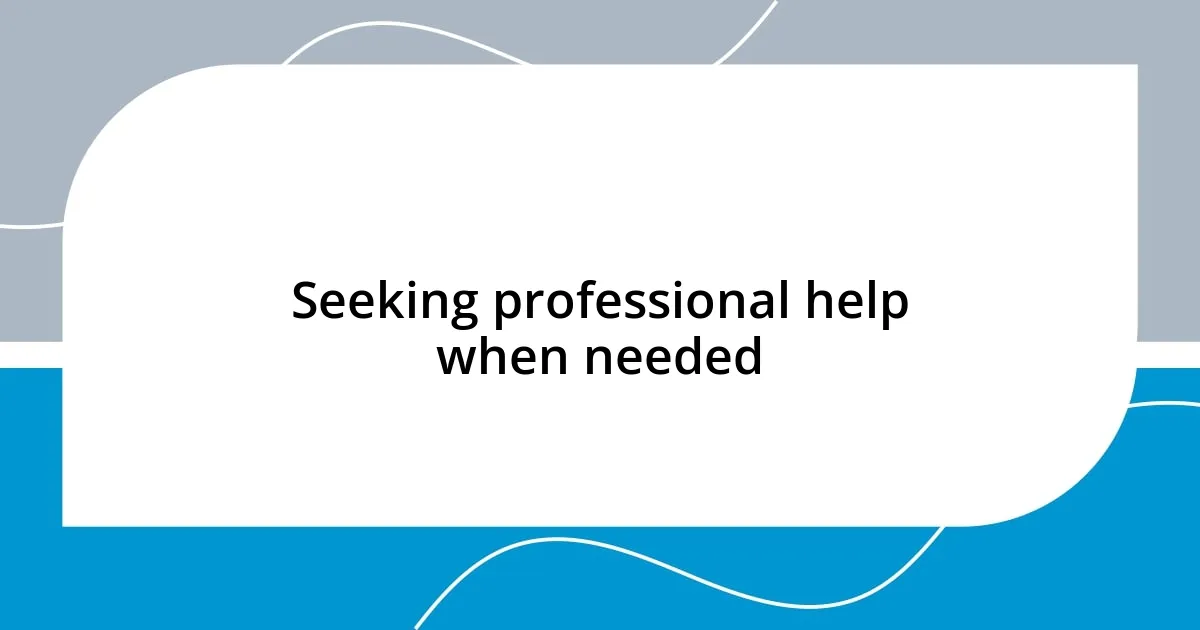
Seeking professional help when needed
Seeking professional help was a pivotal moment in my journey to overcoming social anxiety. I vividly remember sitting in the waiting room, heart pounding at the thought of speaking to a therapist. But once I started talking, releasing all those bottled-up fears, I felt a weight lift. Has the thought of seeking help ever crossed your mind but made you hesitate?
The sessions taught me that my anxiety was not a personal flaw but a challenge I could address. I recall one particular breakthrough when my therapist guided me through a cognitive-behavioral technique to reframe my negative thoughts. That simple shift in perspective shifted the narrative I told myself, illuminating a path forward. How often do we realize that our thoughts can be our biggest obstacles?
Each session became a safe space where I could unpack my feelings without judgment. I often walked out feeling lighter, as if I had shared a burden with someone who truly understood. There were times when I doubted if I’d ever see progress, but my therapist’s unwavering encouragement pushed me to keep going. Have you ever needed that external validation to remind you that it’s okay to ask for help? In hindsight, I realize that seeking professional guidance isn’t a sign of weakness, but a powerful step toward reclaiming my life.






